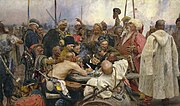Ataman
| Part of a series on |
| Cossacks |
|---|
 |
| Cossack hosts |
| Other Cossack groups |
| History |
| Notable Cossacks |
| Cossack terms |

Otaman (variants: wataman, vataman, ataman, Cyrillic: отаман (Ukrainian), ватаман (Russian, regional), атаман (Russian)) was a general officer title of the Ukrainian People's Army, Cossack, and haidamak leaders who were in essence the Cossacks. In Russia the term was somewhat of derogatory inclination and was used for the leader of a fisherman artel, a band of robbers or thieves, or the opposition forces to the Russian government.
Etymology
The etymology of the word "otaman" is disputed, see Hetman: Etymology. During certain periods the supreme leader of Ukrainian Cossacks was called Hetman.
Uses
Among various types of the military grade of otaman were viysko otaman (військовий отаман), campaign otaman (похідний отаман), kosh otaman (кошовий отаман), kurin оtaman (курінний отаман) as well as territorial leaders: okruha otaman (окружний отаман), stanytsia otaman (станичний отаман), khutir otaman (хутірський отаман).
Usually atamans were elected. However during campaigns they could be appointed. In that case the ataman was called nakazny otaman, (наказний отаман), i.e., acting or appointed ataman.
In the Cossack Hetmanate leaders of non-Cossack military units (artillery, etc.) were also called otamans. In the Cossack Hetmanate the title was used for the administrative purposes such as the head of the city, Otaman horodovy. Later such administrative uses were adopted by the Kuban Cossacks and were common in Kuban Oblast with different variations.
20th century
Atamans were titles of supreme leaders of various Cossack armies during the Russian Civil War.
The head of the army of the Ukrainian People's Republic, in particular, Symon Petliura, was called holovnyi otaman (головний отаман, supreme otaman).
